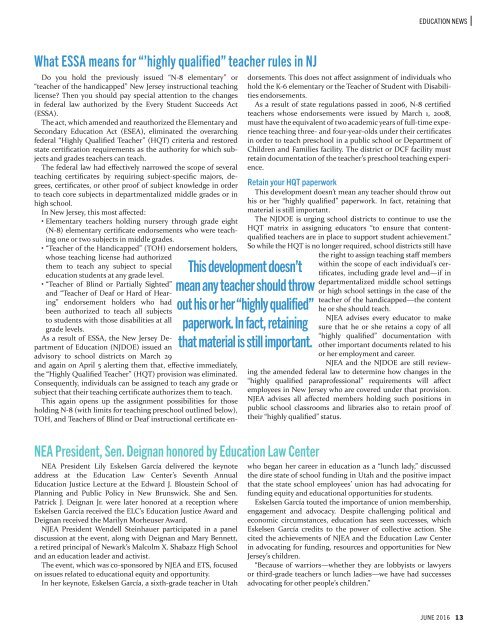HIP-HOP
Review_June2016
Review_June2016
You also want an ePaper? Increase the reach of your titles
YUMPU automatically turns print PDFs into web optimized ePapers that Google loves.
EDUCATION NEWS<br />
What ESSA means for “’highly qualified” teacher rules in NJ<br />
Do you hold the previously issued “N-8 elementary” or<br />
“teacher of the handicapped” New Jersey instructional teaching<br />
license? Then you should pay special attention to the changes<br />
in federal law authorized by the Every Student Succeeds Act<br />
(ESSA).<br />
The act, which amended and reauthorized the Elementary and<br />
Secondary Education Act (ESEA), eliminated the overarching<br />
federal “Highly Qualified Teacher” (HQT) criteria and restored<br />
state certification requirements as the authority for which subjects<br />
and grades teachers can teach.<br />
The federal law had effectively narrowed the scope of several<br />
teaching certificates by requiring subject-specific majors, degrees,<br />
certificates, or other proof of subject knowledge in order<br />
to teach core subjects in departmentalized middle grades or in<br />
high school.<br />
In New Jersey, this most affected:<br />
• Elementary teachers holding nursery through grade eight<br />
(N-8) elementary certificate endorsements who were teaching<br />
one or two subjects in middle grades.<br />
• “Teacher of the Handicapped” (TOH) endorsement holders,<br />
whose teaching license had authorized<br />
This development doesn’t<br />
mean any teacher should throw<br />
out his or her “highly qualified”<br />
paperwork. In fact, retaining<br />
that material is still important.<br />
them to teach any subject to special<br />
education students at any grade level.<br />
• “Teacher of Blind or Partially Sighted”<br />
and “Teacher of Deaf or Hard of Hearing”<br />
endorsement holders who had<br />
been authorized to teach all subjects<br />
to students with those disabilities at all<br />
grade levels.<br />
As a result of ESSA, the New Jersey Department<br />
of Education (NJDOE) issued an<br />
advisory to school districts on March 29<br />
and again on April 5 alerting them that, effective immediately,<br />
the “Highly Qualified Teacher” (HQT) provision was eliminated.<br />
Consequently, individuals can be assigned to teach any grade or<br />
subject that their teaching certificate authorizes them to teach.<br />
This again opens up the assignment possibilities for those<br />
holding N-8 (with limits for teaching preschool outlined below),<br />
TOH, and Teachers of Blind or Deaf instructional certificate endorsements.<br />
This does not affect assignment of individuals who<br />
hold the K-6 elementary or the Teacher of Student with Disabilities<br />
endorsements.<br />
As a result of state regulations passed in 2006, N-8 certified<br />
teachers whose endorsements were issued by March 1, 2008,<br />
must have the equivalent of two academic years of full-time experience<br />
teaching three- and four-year-olds under their certificates<br />
in order to teach preschool in a public school or Department of<br />
Children and Families facility. The district or DCF facility must<br />
retain documentation of the teacher’s preschool teaching experience.<br />
Retain your HQT paperwork<br />
This development doesn’t mean any teacher should throw out<br />
his or her “highly qualified” paperwork. In fact, retaining that<br />
material is still important.<br />
The NJDOE is urging school districts to continue to use the<br />
HQT matrix in assigning educators “to ensure that contentqualified<br />
teachers are in place to support student achievement.”<br />
So while the HQT is no longer required, school districts still have<br />
the right to assign teaching staff members<br />
within the scope of each individual’s certificates,<br />
including grade level and—if in<br />
departmentalized middle school settings<br />
or high school settings in the case of the<br />
teacher of the handicapped—the content<br />
he or she should teach.<br />
NJEA advises every educator to make<br />
sure that he or she retains a copy of all<br />
“highly qualified” documentation with<br />
other important documents related to his<br />
or her employment and career.<br />
NJEA and the NJDOE are still reviewing<br />
the amended federal law to determine how changes in the<br />
“highly qualified paraprofessional” requirements will affect<br />
employees in New Jersey who are covered under that provision.<br />
NJEA advises all affected members holding such positions in<br />
public school classrooms and libraries also to retain proof of<br />
their “highly qualified” status.<br />
NEA President, Sen. Deignan honored by Education Law Center<br />
NEA President Lily Eskelsen García delivered the keynote<br />
address at the Education Law Center’s Seventh Annual<br />
Education Justice Lecture at the Edward J. Bloustein School of<br />
Planning and Public Policy in New Brunswick. She and Sen.<br />
Patrick J. Deignan Jr. were later honored at a reception where<br />
Eskelsen García received the ELC’s Education Justice Award and<br />
Deignan received the Marilyn Morheuser Award.<br />
NJEA President Wendell Steinhauer participated in a panel<br />
discussion at the event, along with Deignan and Mary Bennett,<br />
a retired principal of Newark’s Malcolm X. Shabazz High School<br />
and an education leader and activist.<br />
The event, which was co-sponsored by NJEA and ETS, focused<br />
on issues related to educational equity and opportunity.<br />
In her keynote, Eskelsen García, a sixth-grade teacher in Utah<br />
who began her career in education as a “lunch lady,” discussed<br />
the dire state of school funding in Utah and the positive impact<br />
that the state school employees’ union has had advocating for<br />
funding equity and educational opportunities for students.<br />
Eskelsen García touted the importance of union membership,<br />
engagement and advocacy. Despite challenging political and<br />
economic circumstances, education has seen successes, which<br />
Eskelsen García credits to the power of collective action. She<br />
cited the achievements of NJEA and the Education Law Center<br />
in advocating for funding, resources and opportunities for New<br />
Jersey’s children.<br />
“Because of warriors—whether they are lobbyists or lawyers<br />
or third-grade teachers or lunch ladies—we have had successes<br />
advocating for other people’s children.”<br />
JUNE 2016 13


